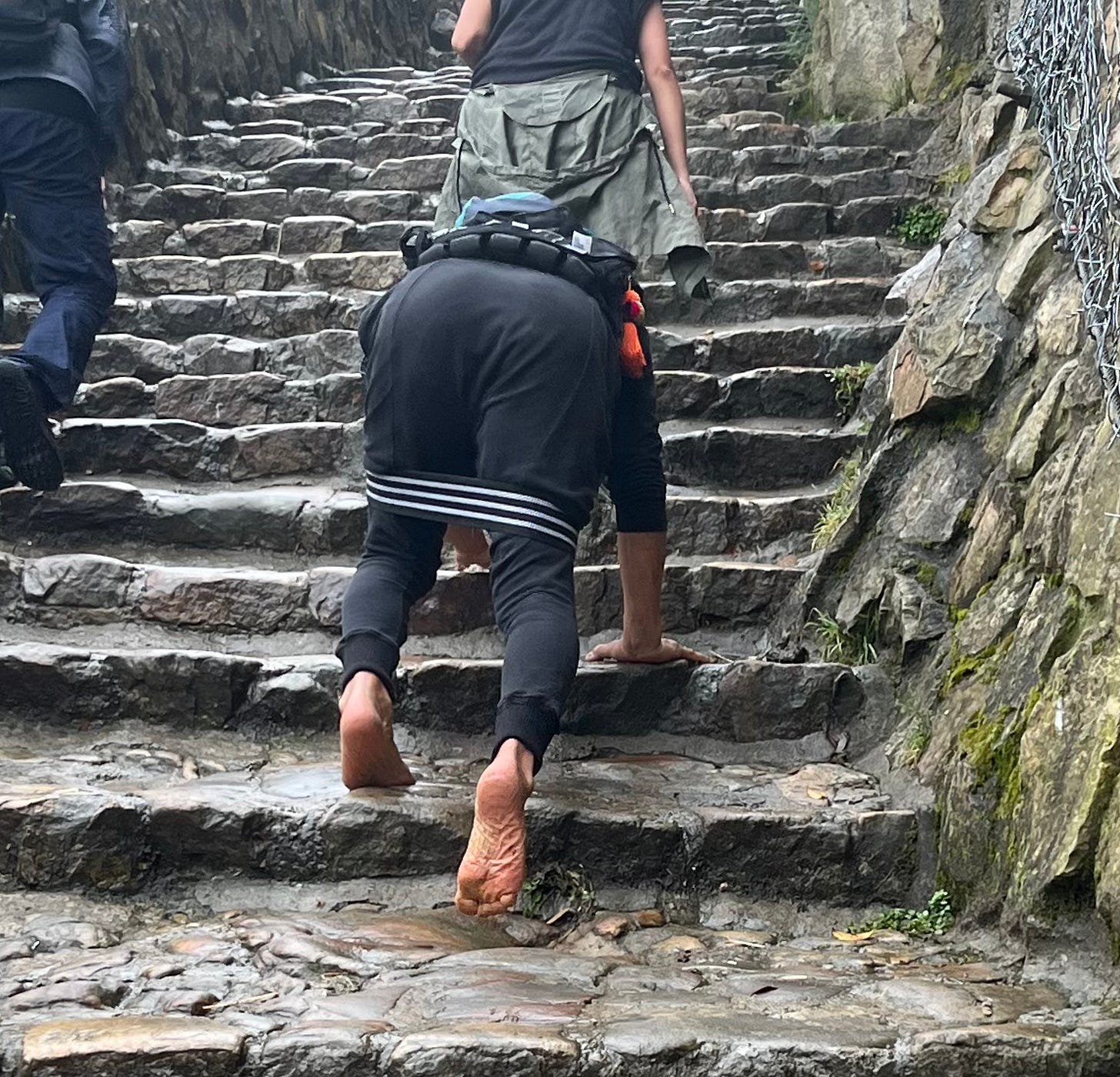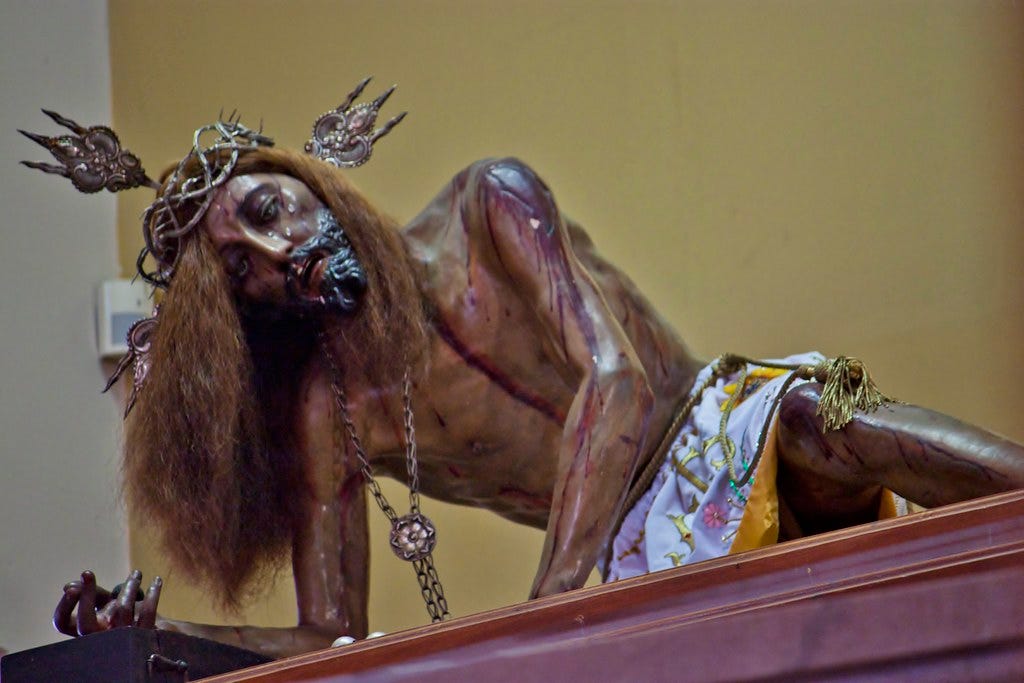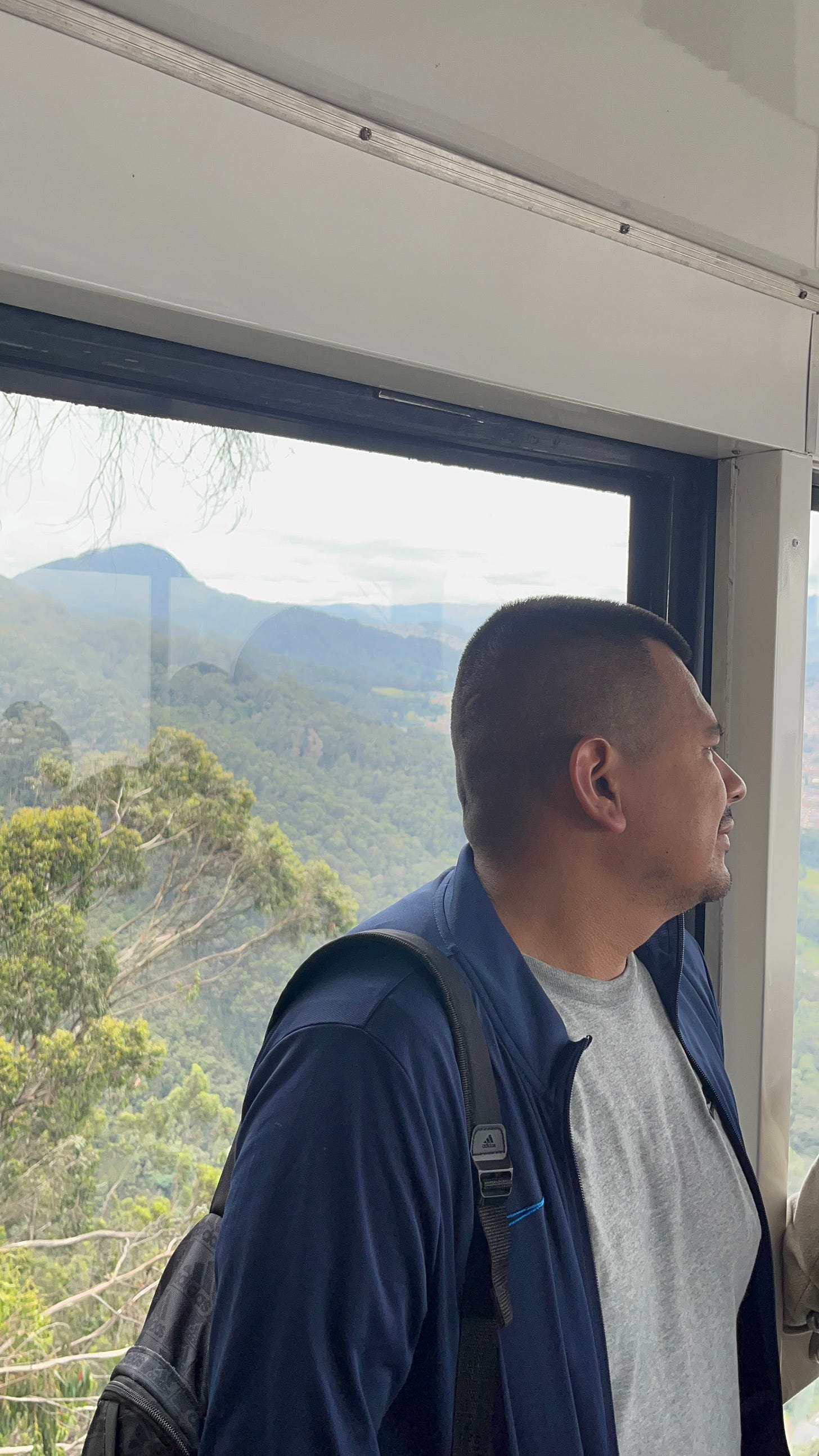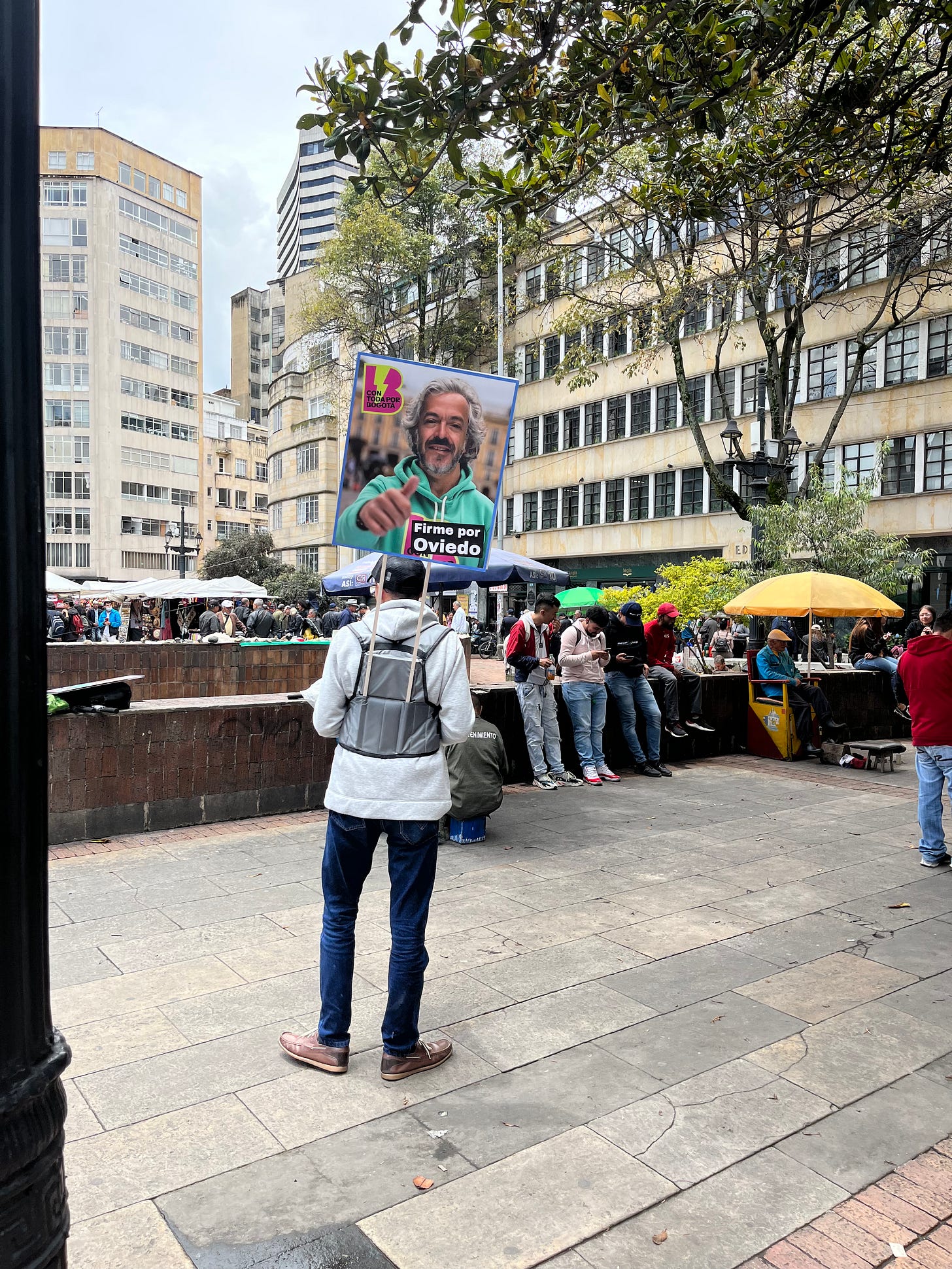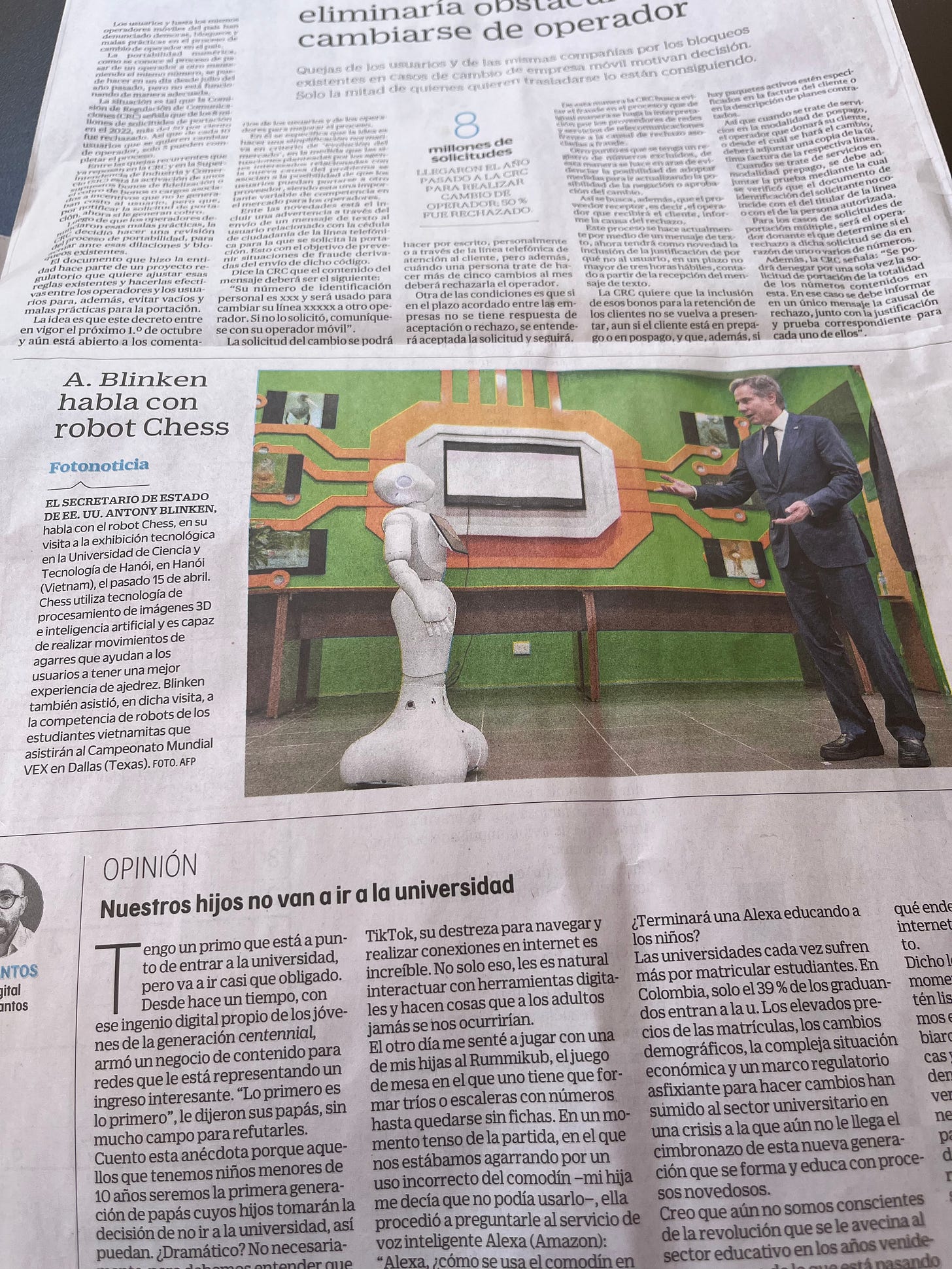The peak of Monserrate, Bogotá’s historic semi-urban mountain, is more than 10,000 feet above sea level. To hike it, rather than opting for the creature comforts of an insulated cable car, one must scale more than 2,500 feet in 1.8 miles. Too many numbers, I know. Just trying to set the scene.
I’m rather arrogant when it comes to hiking, and to be quite clear, my confidence usually descends in direct correlation to my physical ascension up a mountain. My taxi driver warned me that walking Monseratte would take more than an hour and be quite tenuous. What did I care, he was probably in his ‘60s and didn’t fully grasp the extent of my cardiovascular superiority.
20 minutes later, I was likely less than halfway to the top and heaving on the side of the trail, dri-fit shirt drenched in sweat. I was blasting Italian trap music to keep me going, which is usually perfect for strenuous workouts - incomprehensible, loud, somewhat mind-altering. It was no match for the mountain.
That’s when I saw him. A figure straight out of the Old Testament: white beard, ponytail, barefoot and slender. It was hard to detect his ethnicity, much as it is with Christ. He was a few yards up ahead, pausing to catch his breath like me. Yet, as I continued to stand idle, he kneeled down, got on all fours, and continued a four-limbed crawl to the top.
I did not see him at the top. Maybe, I thought, in my elevated heart rate haze, I imagined him. But I do have evidence of this quasi-prophet’s existence.
Since 1620 when a church was erected at its peak, Monserrate has been pilgrimage destination for Catholics across the world. Sometimes, the extra-devout crawl, as I witnessed. The whole scene is a direct legacy of Spanish colonialism: before a shrine to Our Lady of Monserrate was hauled to the top, it was a worship location of the indigenous Muisica. To be a social-justice oriented Catholic is to constantly be faced with challenging contradictions - colonial subjugation and liberation theology both spawned on the same continent. The world is complicated.
A Monday mass was in progress when I reached the peak (in about 40 minutes, so I still beat my chauffer’s expectations). The service was set against the backdrop of El Señor Caído, or the Fallen Christ, a sculpture of a crucified Jesus without his cross. It’s a rather striking, and somewhat ominous caricature to be confronted with while taking communion.
The top of Monserrate has been commercialized, complete with endless trinket shops, cafés, and restaurants. I purchased a beautiful black rosary from a religious shop owner named Julia, who told me her daughter was now living in my hometown of Seattle, married and working as a data analyst.
After some half-decent huevos rancheros, I decided to purchase a ticket on the cable car, which was an enjoyable, less taxing trip down.
Upon exit, I decided to take a short walk back to La Candelaria, where I met my new friend Carlos the day before. Other than being accosted by entrepreneurial spirits trying to sell goods and services I did not take the time to comprehend, it was a pleasant journey. I passed La Universidad de Los Andes, where my mother studied forty years ago, and La Parque de los Periodistas, a modest square dedicated to Colombia’s writers.
In La Candelaria, I noticed a number of young men with large photos of a political candidate named Oviedo strapped to their backs, petitioning for signatures. The candidate sported a teal sweatshirt, long hair, and a slight smile, a kind of college professor look that I imagine played well with the university crowd in the area.
I approached a twenty-something campaign volunteer, and likely to his chagrin, informed him that I was not a voter but was curious to know more about the candidate. Having been on the other side of these conversations as a campaign staffer myself, I appreciated his willingness to chat. Juan Daniel Oviedo is running for mayor of Bogotá as an independent, and since he doesn’t have the institutional backing of a political party, needs to collect thousands of signatures to get his name on the ballot. The former Director General of the National Administrative Department of Statistics with a PhD from the University of Toulouse in France, I reckon he stands a decent chance of victory in the October 29 Elecciones Territoriales. I wished the volunteer well and continued on.
I purchased an English copy of García Marquez’s Love in the Time of Cholera (when in Rome) and Monday’s edition of El Tiempo from the García Marquez Cultural Center, and settled into the attached Juan Valdez Café for a cortado and a bit of reading. The café’s private security guard positioned himself between me and the bustling street, offering a sort-of complimentary security blanket for the gringo to read about the upcoming Colombia-US bilateral meeting between Presidents Gustavo Petro and Joe Biden. Multiple homeless men approached me to express their hunger and need for change, but they were sent back by the uniformed, boyish shift worker. I felt as if I was occupying an ivory tower, complete with a human border between high-minded discussion of international diplomacy and the physical consequences of economic stratification. I didn’t complain. I’m not sure what morsel of meaning should be derived from this. Maybe I’ll think about it again soon.
A restless afternoon nap was interceded with periodic claps of thunder louder than any natural sound I have ever heard. Surely lightning was striking the building as I dozed. Small inconvenience aside, I find myself well-fed after a trip to the gym and content at my Airbnb kitchen table. Nos vemos mañana.





